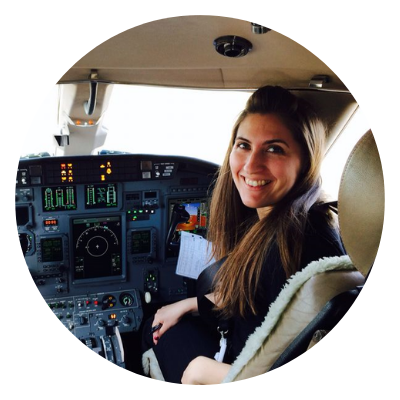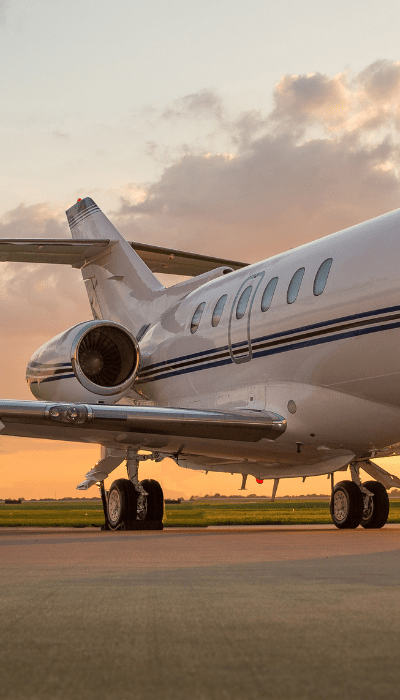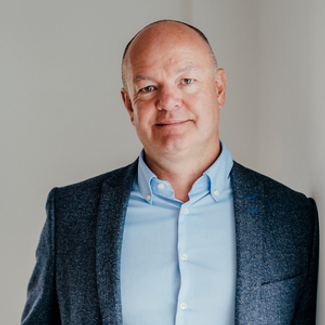At GOOSE Recruitment, we love to speak with Pilots in our network to hear about why they decided to pursue a career in aviation and how they got to where they are today. We were delighted to have the opportunity to catch up with Sue Tuddenham, First Officer at LUXaviationto learn more about her career journey and future aspirations for her piloting career.

When did you begin your career as a Pilot?
I began my aviation career approximately 15 years ago after having a trial flight and absolutely loving it. Everything from that moment until I qualified involved me trying to find a way to fund my flying. I have been in my current role at LUXaviation for seven years and it has been fantastic.
Was there a moment when you knew that you wanted to become a Pilot and what route did you take to pursue your career?
After I finished studying English Literature at University, I was volunteering in Romania to help build orphanages and teach English. We needed to raise money for the charity, and I decided to do a charity skydive for the cause. I watched the Pilot as we ascended towards the skydive and I thought “I fancy having a go at that”.
A few weeks later by pure chance, a friend saw an advert in the local paper from the BWPA (British Women’s Pilot Association) advertising 50 sponsored bursary trial lessons for women to celebrate their 50th anniversary, aimed at encouraging women to fly. I applied, I won, I had a trial lesson and from that moment I was hooked.
What does your current role entail as a First Officer at LUXaviation?
My current role in business jets is extremely varied and I get involved in all areas of flying, making it very different to working for a commercial carrier. On a usual flight day, I meet the captain, we run through the flight route and paperwork, check the weather reports, meet with the operations team, and speak to the handing agent to organise the aircraft coming out of the hanger. We even deal with organising the fuel and getting the passengers’ bags onboard. I also meet the passengers as they embark on the aircraft and conduct the safety brief before take-off.
We do not always have cabin crew on the Europe routes as the flights are short, so I am usually responsible for the catering, looking after the passengers, and flying the plane. In this role, you are the face of the company, so it is crucial to maintain a strong reputation and always make customer service a priority.
How different is your role as a business jet pilot compared to commercial flying?
The main difference is that we wait for the passenger, as opposed to the passenger waiting for the plane. There is also a great deal of variety in business jets as the flying routes can change daily. One day we could be flying into a large international airport and the next a small strip on an island or mountainous resort.
On numerous occasions, the flight has been cancelled or the destination has suddenly changed. Once a passenger has even said “It’s a bit rainy in London, I don’t fancy going back today. Can we go to Ibiza instead?” Cases like these are not rare, so you just have to go into work with an open mind, whilst being extremely flexible and adaptable.
I do also think that there is a bit more glamour in business jets because you get to stop in some amazing luxurious places and get to enjoy them. As I spent my earnings on becoming a Pilot in my twenties, I am glad that I now get to explore incredible new destinations and pursue a job that I love.
Besides the required professional qualifications and licenses, what skills and traits do you think are important for Pilots to possess in today’s current climate? Do you think these will change in the future?
I think that it is important to possess both soft skills and flying skills. Whatever level you are flying at you must be flexible and resilient. The aviation industry is extremely sensitive to the economic climate and there will be times of boom and bust. Therefore, it is important to stay on top of your training and do everything that you can to keep your skills current and prevent skills fade. Unemployment is sadly affecting so many in this industry at the moment but the pilot community is resourceful and many are using the time to enhance their transferable skills including teamwork, customer care, leadership and customer-facing skills, which are all important in the role of a Pilot.
What advice would you give to individuals wanting to pursue a career in piloting?
Firstly, go for it and do not let anything stop you, just keep going. You need to be prepared to work hard because there are so many exams and when you are in the job you will constantly be examined and put through rigorous training.
When it comes to funding your flying, I would say to be as creative as you can. Not everyone comes from a privileged background, but it is entirely possible to fund your flying, you just have to hone in on the many great ways to fund your lessons.
What do you think is the most challenging and rewarding aspect of working in the aviation industry?
The most rewarding aspect of working in the industry is that there are constantly opportunities to enhance your skills and develop in your career. There is always something bigger and better that you can do. You will never get bored.
I also love that you are always at the forefront of cutting-edge technology and safety because the industry leads when it comes to these innovations. Then there are the opportunities to travel and see the world, whilst meeting new people every day.
The downside is the unpredictability of the role, which makes it hard to plan anything in advance because your roster can change at any time. With this also comes the sensitivity to the economic climate as aviation is typically the first industry hit by a recession. Therefore, job stability can be turbulent and challenging.
You were the previous scholarship coordinator for the British Women's Pilots Association. What were the key initiatives that you were driving in your role? And how important are groups like this for female aviation professionals?
Grassroots projects and organisations like the BWPA, that provide access to information about flying and even bursaries are so important in increasing diversity within the pilot population. Personally, the BWPA provided my first flight and gave me a leg up in the industry. I am grateful that I was able to stand up 10 years later at their 60th Anniversary as a Commercial Pilot and share my story.
As Scholarship Coordinator my aim was to increase scholarships; we increased our offering and achieved a lot of funding for extra sponsorships. We were also able to use our funding and extensive network to support Pilots who were made redundant from the pandemic.
Another key initiative was to establish a new strategy for promoting the BWPA, increasing memberships and encouraging more women to pursue a career in piloting, whilst making them aware of the opportunities that are available to them. This is fundamental when it comes to promoting STEM subjects to women and children, or those from less advantaged backgrounds who may not have thought about an aviation career.
Do you think enough is being done to promote a career in Piloting/Aviation to women?
A lot is being done but there is always room for improvement. There are organisations like the BWPA that have outreach to support and encourage women, financially and emotionally but also actively go into schools to promote and encourage students to study STEM subjects and make them aware of the opportunities available to them. EasyJet also successfully launched the Amy Johnson Initiative in 2015 to tackle the low population of female Pilots and inspire the next generation to pursue a career in Piloting.
However, there is still a long way to go to increase the female pilot population and it would be great to have wider engagement from the major airlines to initiate more projects to entice women into the workforce.
What has been the most memorable moment in your career?
The moment that I flew solo was amazing, I could not believe I was flying a plane on my own. I would also have to say the time that I saw the Northern lights across Norway as I was flying at night. It was breathtaking, especially as it was cloudy the entire time that we were there.
However, some of my proudest work has been working on Air Ambulance flights as it is so rewarding to know that you are helping to save someone’s life. These flights put everything into perspective.
What do you hope to be doing in five years?
Pre-COVID I was preparing to start my Command Training, but I am just grateful to be in a role. However, in the next five years, I aim to complete this and become a Captain or go on to work for a bigger fleet with long-haul routes. Perhaps instructing or working for the airlines could be an option too but for now, my focus is on getting that next promotion.
GOOSE loves to talk to Aviation Professionals from across the world
Follow GOOSE Recruitment on LinkedIn, Facebookand Twitterfor the very latest aviation news, updates, exclusive insights and regular hot jobs.






